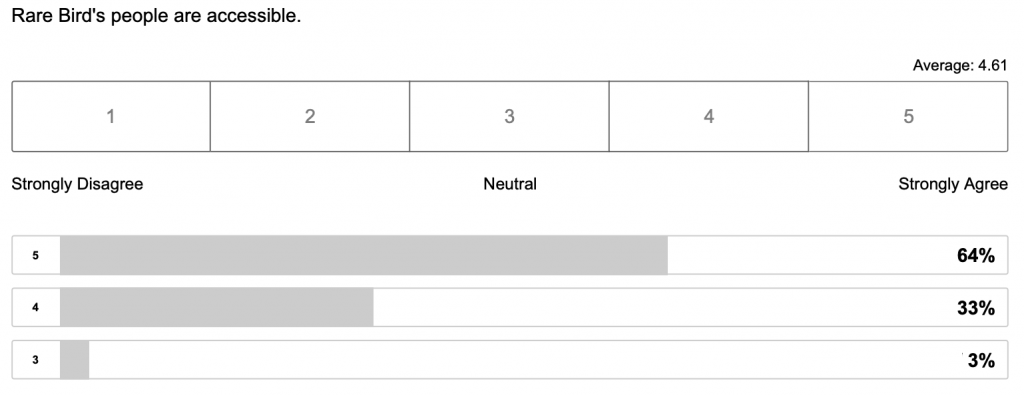
On her second day of second grade, my daughter was given a worksheet with a variety of prompts for her to complete. They were personality-related, designed to encourage her think about her own traits and how she might like to be known to the rest of the class. It included things like:
- My favorite colors are green and blue and pink
- I am good at tennis and swimming
- The thing people like best about me is I’m nice
- The thing I like best about me is I am smat
Of course, she was understandably mortified to later realize that she had forgotten the ‘r’ in smart. But it reminded me that our perceptions of ourselves don’t always match how other people see us. This came to mind while I was analyzing the results of a customer survey recently undertaken here at Rare Bird.
A couple of years ago, I devoured a book called “Managing the Professional Services Firm” by David H. Maister. I’ve read a lot of business books over the years, but never one that was more impactful. My copy is dog-eared and full of highlights and notes and I find myself returning to it often, either physically or in my thought processes. In the book, the author makes the case that customer surveys are invaluable tools to provide insight into the work you’re doing and how you might be either exceeding or falling short of customer expectations.
Without asking the people that matter most, you run the risk of continuing down a path that might be leading you to disaster. To the contrary, a well-planned and executed survey can open a dialog uniquely suited to help improve your organization and fine-tune your products and services. To be sure, asking how you’re doing definitely opens you and the organization to criticism, which is precisely the point. It takes courage to be so openly vulnerable, but it’s imperative if you want to create an organization that is built to last through the years.
In our case, as we prepared the questions, I readily recognized some of the areas where I suspected we’d get positive feedback on things we do well. I was also pretty sure I could identify some areas where we’d be challenged.

But no matter how well I thought I knew both our strengths and our weaknesses, there were surprises in the data. Through a series of 22 questions, respondents rated us on a scale of 1-5 (1=Strongly Disagree; 5=Strongly Agree). I found out, for instance, that while people think we have a good understanding of their business (4.36) and we’re very helpful in redefining their view of a given situation (4.33), we’re not as proactive (3.48) as people would like us to be. We learned that we listen well (4.42), our communication is free of jargon and easy to understand (4.52), and we explain what we’re doing and why (4.21), but we don’t communicate the progress of projects as often as we should (3.91).
Overall, the process was enlightening and informative and I’m deeply appreciative to everyone who took the time to respond. We’ve been able to identify some weak points in our processes and communications and put corrective measures in place. We’ve also received some nice confirmation that some of our core values — our customers know how important they are to us (4.33) and feel that we’re an easy firm with which to work (4.48) — are being perceived exactly as intended. But until we’re scoring perfect fives across the board, there will always be something to work on.
The plan is to continue updating our efforts to respond to the needs of our clients, then survey everyone again in a few months to see if we’re able to move the needle. A strategy, in the words of my daughter, that is smat for any business.
Great read and congrats on your wisdom to seek customer insight!
Not surprising – Your Team gets it.
Values
Clarity
Action
Delivery
“VCAD” is a process to create sustainable results for individuals and Teams. Funny, in a complex world, it’s really as simple as focusing on the human connections.
Nice job Team Rare Bird. Be well. Play nice.